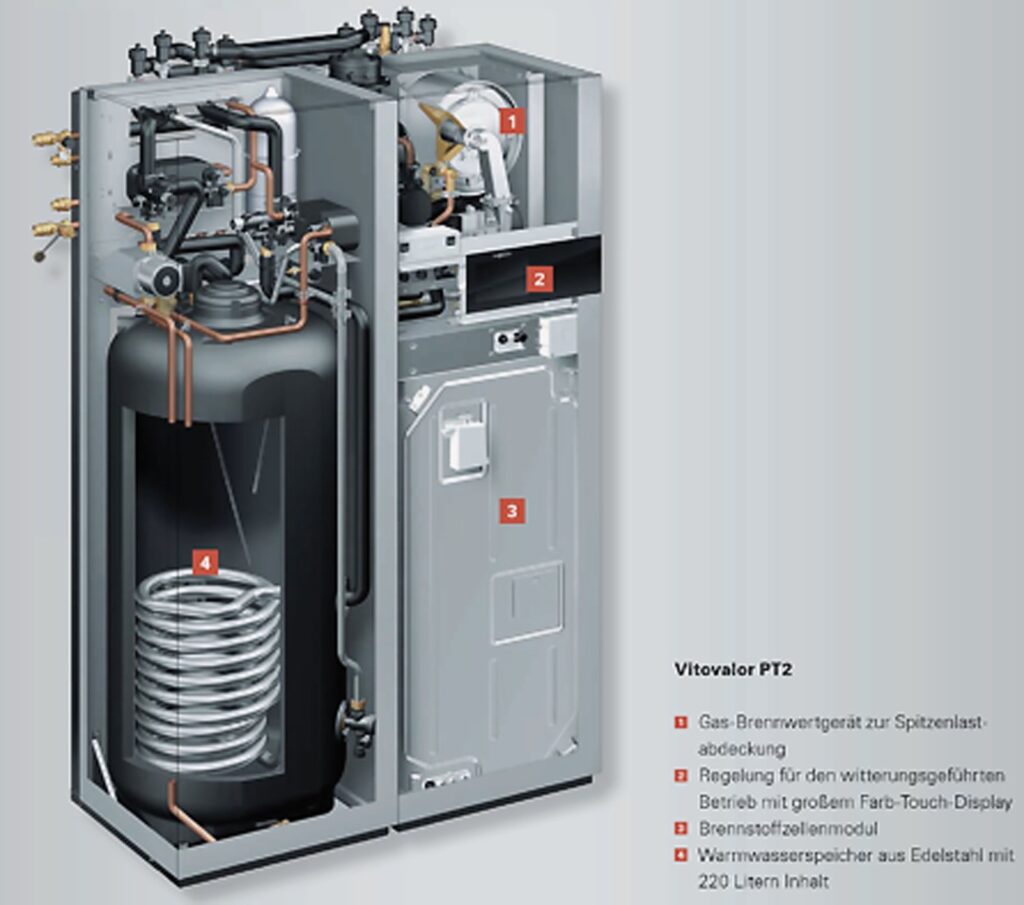Fuel cells for homes and properties
Fuel cells for homes and properties provide clean silent electricity. High current prices hinder their acceptance, but this may soon change. Fuel cells enhance solar. Furthermore, they may all but eliminate our need for battery storage. Fuel cells hugely reduce harmful emissions.
Fuel cells for homes and properties provide clean quiet electricity. This article explains how, why and when they will be used. Fuel cells for homes and properties may all but eliminate battery storage. Moreover, fuel cells slash harmful emissions. This is a major bonus for all-electric cars.

The Panasonic fuel cell in the German Vitovalor product. Pic: Viessmann.
In 1839 Sir William Grove invented the first fuel cell. Petroleum was then found in abundance, resulting in fuel cells being overlooked. NASA later revived them.
Fuel cells for homes and properties – how fuel cells work
Fuel cells generate electricity. They do so via hydrogen reacting with oxygen. Heat, electricity and ultra-clean water-vapour results. Fuel cell chemistry is complex, but having no moving parts is a bonus. Fuel cells are easy to use, ultra-reliable and silent.
Hydrogen that fuel cells does not exist in free form. It can be produced from water, biomass, minerals and fossil fuels. Furthermore, it is readily produced from solar energy. Moreover, hydrogen is an energy multiplier and carrier. So, rather than using batteries, hydrogen can alternatively store energy. This is already being exploited (see below).
Fuel cells for homes and properties – hydrogen (how safe)
All fuels store energy. They have to be volatile. But unlike most fuels, hydrogen is not toxic. Furthermore, spilled hydrogen quickly evaporates. It leaves only tiny amounts of ultra-pure water.
Some quote the Hindenburg disaster. This airship used a huge volume of hydrogen contained within the airship’s outer skin. That skin was cellulose nitrate plus aluminium flakes. Rocket fuel uses the same products. That of the Hindenburg’s finally ignited.
Commercial hydrogen is stored in strong tanks. These are tested and certified accordingly. The risk is no higher than if containing any other fuel.
Fuel cells for homes and properties – storing solar energy
Solar-generated electricity readily converts to hydrogen via an electrolyser. Hydrogen thus becomes the storage medium. This removes the need for batteries.
Western Australia has an example. There, gas company ATCO is building a massive solar array to power its buildings. Surplus energy will produce hydrogen for fuel cell use. The excess will feed into the natural gas network. Other countries already do this.
Solar and wind electricity is now cheap. Hydrogen enables that energy to be stored cheaply.
Fuel cells – what’s available now
Now made are fuel cells for use in homes and properties. Panasonic supplies most. It has sold about 100,000 systems in Japan. This is about half of all such sales. Germany’s Viessmann company uses Panasonic’s fuel cell. It does so in a unit that produces 30.8 kW heat, plus 18kWh electricity. Toshiba too produced fuel cells for a time but has now ceased.
The CSIRO-designed BlueGen fuel cell endured business ups and downs. It is now made by SOLIDpower and Bosch Thermotechnology. The brand name is Buderus.
 The original Australian Blue-Gen unit. Pic: 2014.
The original Australian Blue-Gen unit. Pic: 2014.
The unit generates about 35.6 kilowatts/day (at 1.5 kilowatts). Surplus energy can be sold to the grid. Furthermore, its waste heat can produce hot water. Some were sold earlier in Australia, however, there is no current information regarding representation or sales.
Start-up capital
Much fuel cell promotion is to secure start-up capital. Likewise, companies researching or developing. However, Efoy apart, no fuel cell maker is known to be profitable.
Watch this development. It has profound implications. Hydrogen hugely reduces emissions. Moreover, it exploits a resource (sunlight) virtually assured for millions of years. Furthermore, as oil supplies dwindle, the world may eventually adopt a hydrogen-based economy.

 The original Australian Blue-Gen unit. Pic: 2014.
The original Australian Blue-Gen unit. Pic: 2014.


